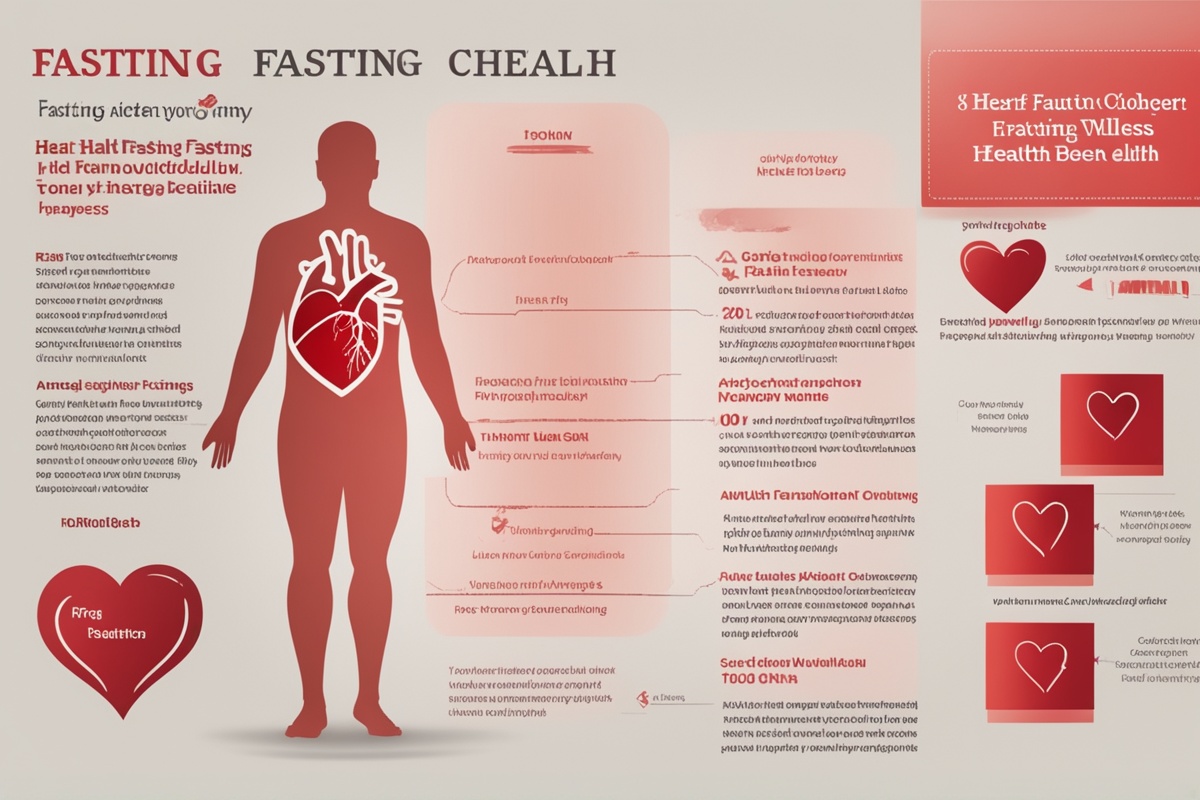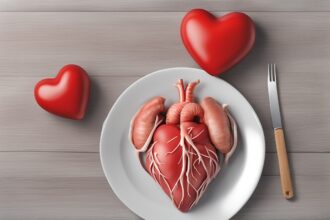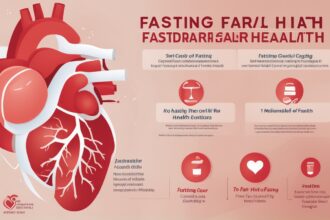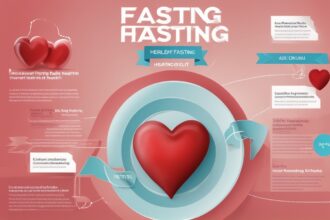Hey there, health enthusiasts! If you’re exploring ways to boost your cardiovascular wellness, you’ve likely stumbled upon the buzz around intermittent fasting. But did you know that fasting could be a game-changer for your heart? In this deep dive into fasting heart health, we’ll unpack how this dietary approach might just be the key to a stronger, healthier ticker. From reducing risk factors like high blood pressure to improving cholesterol levels, fasting isn’t just about skipping meals—it’s about giving your heart a fighting chance. Stick with me as we explore the science, practical tips, and real-world benefits of integrating fasting into your heart-healthy lifestyle.
What Is Intermittent Fasting, and How Does It Relate to Heart Health?
Intermittent fasting (IF) isn’t a diet in the traditional sense; it’s more of an eating pattern. It involves cycling between periods of eating and fasting, with popular methods like the 16/8 (fast for 16 hours, eat during an 8-hour window) or the 5:2 (eat normally for 5 days, restrict calories on 2 days). But how does this connect to fasting heart health? The idea is simple: by giving your body a break from constant digestion, you allow it to focus on repair and recovery processes that directly impact cardiovascular function. Studies suggest that fasting can lower inflammation, improve blood sugar control, and reduce oxidative stress—all major players in heart disease prevention (Mattson & Wan, 2005). Let’s dive deeper into how this works and why it’s catching the attention of cardiologists and health buffs alike.
The Science Behind Fasting and Cardiovascular Benefits
Alright, let’s get into the nitty-gritty. Heart disease remains the leading cause of death worldwide, so finding lifestyle interventions that work is crucial. Fasting has shown promising results in several areas of cardiovascular health. For starters, it can help reduce blood pressure, a key risk factor for heart attacks and strokes. Research indicates that intermittent fasting may lower systolic and diastolic blood pressure by improving insulin sensitivity and reducing stress hormones like cortisol (Patterson & Sears, 2017). Additionally, fasting has been linked to better lipid profiles—think lower LDL (“bad”) cholesterol and higher HDL (“good”) cholesterol—which are vital for keeping your arteries clear (Tinsley & La Bounty, 2015).
But that’s not all. Fasting also triggers a process called autophagy, where your cells clean out damaged components. This “cellular housekeeping” can protect against the buildup of plaque in arteries, a precursor to heart disease (Levine et al., 2017). These benefits aren’t just theoretical; they’re backed by emerging research showing that fasting for heart wellness could be a powerful tool. Of course, more long-term human studies are needed, but the early data is exciting for anyone looking to prioritize their heart.
Key Heart Health Benefits of Fasting
If you’re wondering exactly how fasting can supercharge your cardiovascular system, let’s break it down into actionable benefits. These are the reasons why so many people are turning to intermittent fasting for heart health and seeing real results. Here’s a quick rundown of what science and experts have to say:
- Improved Blood Sugar Control: Fasting helps regulate insulin levels, reducing the risk of type 2 diabetes—a major contributor to heart disease (Barnard et al., 2019).
- Weight Management: By naturally reducing calorie intake, fasting can help shed excess pounds, easing the strain on your heart.
- Reduced Inflammation: Chronic inflammation damages blood vessels, but fasting lowers inflammatory markers like C-reactive protein (CRP) (Faris et al., 2012).
- Better Stress Response: Fasting may lower cortisol levels, reducing stress-related heart strain.
Practical Tips for Incorporating Fasting Into a Heart-Healthy Routine
Now that we’ve covered the “why” behind fasting heart health, let’s talk about the “how.” Starting a fasting regimen doesn’t have to be intimidating, especially if you’re new to it. The key is to ease in and make it sustainable while keeping your cardiovascular goals in mind. I’ve put together some practical tips to help you get started without feeling overwhelmed. Remember, always consult your doctor before making big changes, especially if you have pre-existing heart conditions or are on medication.
- Start Slow: If you’re a beginner, try a 12/12 fasting schedule (12 hours fasting, 12 hours eating) before moving to more intense protocols like 16/8.
- Stay Hydrated: Drink plenty of water during fasting windows to support circulation and prevent dehydration, which can strain your heart.
- Focus on Nutrient-Dense Foods: Break your fast with heart-healthy foods like avocados, nuts, fatty fish, and leafy greens to maximize benefits.
- Avoid Overeating: It’s tempting to binge after fasting, but overeating can spike blood sugar and negate heart health gains.
- Monitor Your Body: Pay attention to how you feel—dizziness or fatigue could mean you need to adjust your fasting plan or seek medical advice.
Potential Risks and How to Mitigate Them
While the benefits of fasting for cardiovascular health are impressive, it’s not a one-size-fits-all solution. Fasting can pose risks, especially if done improperly or without medical guidance. For instance, extended fasting periods might lead to low blood sugar, which can be dangerous for those with diabetes or heart conditions. There’s also the risk of nutrient deficiencies if you’re not mindful of what you eat during feeding windows. Experts caution that fasting isn’t suitable for everyone, including pregnant women, the elderly, or those with certain medical issues (American Heart Association, 2020).
The good news? Most risks can be managed with a thoughtful approach. Work with a healthcare provider to tailor a fasting plan to your needs. Keep fasting windows moderate, and don’t push yourself too hard too soon. And if you’re on heart medications, never skip doses or adjust them without professional input. By staying informed and cautious, you can safely explore how heart health and fasting work together for your wellness.
Fasting as Part of a Broader Heart-Healthy Lifestyle
Let’s be real—fasting alone isn’t a magic bullet for heart health. It’s most effective when paired with other lifestyle habits that support cardiovascular wellness. Think of fasting as one piece of the puzzle, working alongside exercise, stress management, and a balanced diet. Regular physical activity, like brisk walking or cycling for 30 minutes most days, boosts the heart-protective effects of fasting by improving circulation and endurance. Stress reduction techniques, such as meditation or yoga, complement fasting’s ability to lower cortisol and inflammation. And don’t forget sleep—aim for 7–9 hours nightly to let your heart recover and repair.
Ultimately, fasting heart health is about balance. It’s not about extreme deprivation or overhauling your life overnight. It’s about making intentional choices that add up over time. Whether you’re fasting for a few hours a day or a couple of days a week, combining it with these habits creates a powerful synergy for a healthier heart. So, why not start small and see how these changes feel? Your heart will thank you.
As we wrap up this journey into fasting heart health, it’s clear that intermittent fasting offers a promising path to better cardiovascular wellness. From lowering blood pressure and improving cholesterol to reducing inflammation and supporting weight loss, the benefits are hard to ignore. But remember, fasting isn’t a standalone fix—it shines brightest when paired with a holistic, heart-focused lifestyle. Take it slow, listen to your body, and consult with healthcare pros to make sure you’re on the right track. Whether you’re a fasting newbie or a seasoned pro, integrating this practice thoughtfully could be a step toward a stronger, healthier heart. So, what are you waiting for? Let’s give our hearts the care they deserve!
References
- American Heart Association. (2020). Intermittent fasting and heart health: What you need to know. Retrieved from heart.org
- Barnard, N. D., Goldman, D. M., Loomis, J. F., et al. (2019). Plant-based diets for cardiovascular safety and performance in endurance sports. Nutrients, 11(1), 130. doi:10.3390/nu11010130
- Faris, M. A., Kacimi, S., Al-Kurd, R. A., et al. (2012). Intermittent fasting during Ramadan attenuates proinflammatory cytokines and immune cells in healthy subjects. Nutrition Research, 32(12), 947-955. doi:10.1016/j.nutres.2012.06.021
- Levine, B., Packer, M., & Codogno, P. (2017). Autophagy in cardiovascular health and disease. Circulation, 135(23), 2258-2266. doi:10.1161/CIRCULATIONAHA.117.027406
- Mattson, M. P., & Wan, R. (2005). Beneficial effects of intermittent fasting and caloric restriction on the cardiovascular and cerebrovascular systems. The Journal of Nutritional Biochemistry, 16(3), 129-137. doi:10.1016/j.jnutbio.2004.12.007
- Patterson, R. E., & Sears, D. D. (2017). Metabolic effects of intermittent fasting. Annual Review of Nutrition, 37, 371-393. doi:10.1146/annurev-nutr-071816-064634
- Tinsley, G. M., & La Bounty, P. M. (2015). Effects of intermittent fasting on body composition and clinical health markers in humans. Nutrition Reviews, 73(10), 661-674. doi:10.1093/nutrit/nuv041






